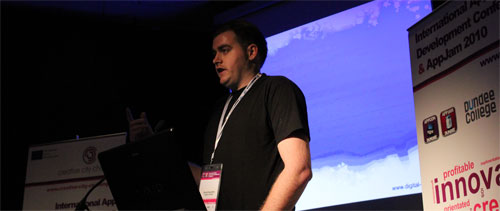November 8th, 2010 by Arjan Olsder Posted in Analysis & Editorial | No Comments »
 David Hamilton from Digital Goldfish discusses the pro’s and cons of being a small developer in a (by now) huge industry.
David Hamilton from Digital Goldfish discusses the pro’s and cons of being a small developer in a (by now) huge industry.
Digital Goldfish started by creating niche games. It was a team of two guys aiming at he young female demographic. The company started when the J2me age was blooming and aimed at self publishing instead of going over operators in the hope to become overnight millionaires. Though they advertised the games, the marketing budgets never really paid off.
One of the problems they had, was the popularity of black & white phones amongst teens and their games where not made for those devices. With the second game, the team decided to move through publishers, but most of them didn’t have interest until they met Paul Farley from TAG Games. TAG distributed the game through GlobalFun (that recently went bust).
The reason for choosing GlobalFun was the device list they had to support as it was the smallest of the publishers. Still porting and testing on all those devices was a pain for the small outfit. The arrival of the iPhone was a blessing to the team.

While Cobra Mobile told the team they would not be ready for developing on an advanced platform like the iPhone, the team decided to take a web game called Bloons to the platform. The game had success and was the first UK game to hit the #1 spot on the US charts.
Following Bloons, the company launched Bloons Tower Defense, a game requested in the Bloons reviews. The game reached #3 all over the world and is still in many top 100 listings. As this second game was more expensive, the revenues from Bloons Tower Defense surpassed that of Bloons.
It is safe to say, the iPhone allowed the two man strong team could start working full-time on their apps instead of filling the shelves at Tesco’s to keep a healthy cashflow. It also allowed them to sign up for licenses with companies like Channel 4. Another benefit is that the company can choose itself what it wants to develop as publishers didn’t believe in many of the prototypes they made in the J2me era. Companies like Microsoft and Nintendo have also been contacting the studio for their titles.
For the future, the company wishes to focus more on original IP, it wishes to push through the ‘Get More Games’ function in their current games. The studio thinks this is where the money is. It will also be working more closely with publishers and other developers.

